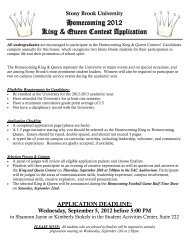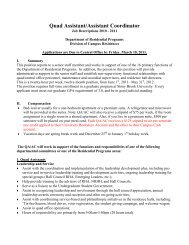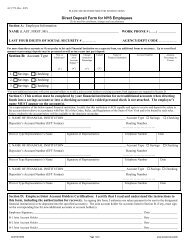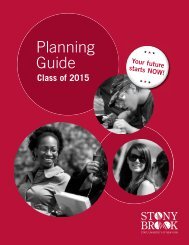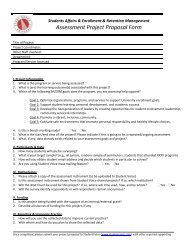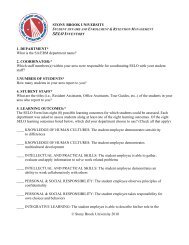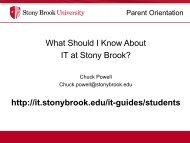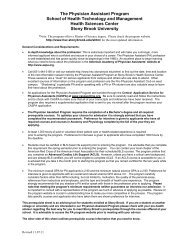PreLaw Guide - Student Affairs - Stony Brook University
PreLaw Guide - Student Affairs - Stony Brook University
PreLaw Guide - Student Affairs - Stony Brook University
Create successful ePaper yourself
Turn your PDF publications into a flip-book with our unique Google optimized e-Paper software.
Tips for Writing Your Best Law School Personal Statement<br />
1. Your personal statement should give a sense of who you are – your values and passion, but don’t beg<br />
for admission!<br />
2. Law schools want to know who you are – not the specialty area that interests you. Law schools want<br />
you to be open to all areas of law.<br />
3. Your personal statement is a substitute for the interview. Law schools deliberately do not have interviews<br />
because they expect applicants to utilize the English language, since the written word is an<br />
important part of being a lawyer. Use the essay to write about what you would have said in the interview.<br />
Here’s an example: If you had 5 minutes to make a pitch about yourself in an interview, figure<br />
out what you would say, speak into a tape recorder, play it back, and write about it.<br />
4. Don’t use your personal statement as a time to review your resume and waste valuable space! Keep<br />
your personal statement limited to what has been stated on the application.<br />
5. Your statement should be personal and self-revealing, but not maudlin. Use good judgment by not<br />
writing something too personal. Your statement must sound like you, not like a legal brief; it can have<br />
a “chatty” tone, but should be written in your own voice.<br />
6. Let the reader in on the process. For example, explain why you did something, or what caused you<br />
to make a change in life circumstance, or what led you to law school. You should lay out the process<br />
in your statement – include anecdotes, how you problem-solved, what you expected, and what you<br />
learned about yourself. The reader should be able to understand how your mind works, and how you<br />
came to a particular conclusion, without giving every detail. Engage the reader and lead the reader to<br />
the conclusions you want; in other words, “show, don’t tell”.<br />
7. Use good judgment. Don’t be too intimate in your statement; use discretion – it is a balancing act.<br />
Everything you write about must be true, but you don’t have to tell everything about you!<br />
8. Don’t name traits – describe them. For example, instead of saying you are hard working, provide<br />
an example or evidence for your claim. (i.e., “I was studying so hard, I was locked overnight in the<br />
library.”) Tell a story that highlights the traits you want someone to learn about you.<br />
9. Always be positive in your personal statement. Even if you are writing about something sad, end your<br />
story on a positive note (i.e., turning your life around.)<br />
10. Your personal statement should be non-speculative. You should stick to writing about the past and the<br />
present. Let the law schools draw their own conclusions about your future.<br />
11. Pick a story (or two related stories) that most define you. The story should be distinctive so that it<br />
gives you a “label” as a candidate. You want the law school to REMEMBER you as “the candidate<br />
who wrote about [something good and memorable]”. Your essay should be prosaic, and constructed<br />
around a metaphor, theme, or label. It should be written in-depth enough so that it says something<br />
important about you. Law schools want classic prose – write intellectually acute – not cute!<br />
12. Seek feedback on your personal statement from trusted friends, faculty, and pre-professional advisors.<br />
The Six Biggest Errors in Writing Your Personal Statement<br />
1. Having spelling and grammar errors. Don’t rely on spell check to catch everything!<br />
2. Having a statement in your essay that reads “I really want to go to Duke Law School”, but sending it in<br />
an envelope to Northwestern <strong>University</strong>.<br />
3. Putting your resume information in your personal statement.<br />
4. Focusing on your weaknesses, whining, and giving excuses.<br />
5. Writing a personal statement that is too cute – for example, starting with a famous quote, using a crazy<br />
font, or printing it on pink paper or with green ink.<br />
6. Writing a personal statement that is not personal at all or lacks any self-revelation.





